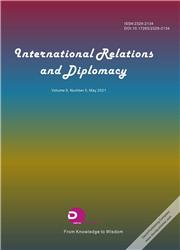Electoral Authoritarianism in Togo: How Has Foreign Aid Impacted the Democratization Process in Togo From 2005 to 2010?
引用次数: 1
Abstract
After four decades of military dictatorship, Togo is still facing a dilemma of whether to break with the past and take a path of democratization or make changes in the continuity. The death of the former President Gnassingbe Eyadema in 2005 was seen by the Togolese community at home and around the world as a window of opportunity or a step toward the emergence of the political liberalization in the country. Unfortunately, with the backing of the Togolese army, Faure Gnassingbe, one of the sons of Eyadema, was enthroned as the country’s new President since 2005. The international economic sanctions on Togo in the aftermath of the death of Eyadema, due to continuing human rights abuses and violations by the authoritarian regime, have accentuated the already acute suffering and poverty of the Togolese population. However, the 2006 Global Political Agreement reached between the traditional political opposition parties and the government paved the way to the normalization of the international cooperation with Togo and hence the lifting of economic sanctions by the international community. Drawing from Solow-Swan growth model and a cross-national causality test of the development-democracy-growth hypothesis of Abbas Pourgerami, this paper investigates the impact of foreign aid on the democratization process since 2005 and argues that foreign aid played a paramount role in consolidating electoral authoritarianism instead of establishing a viable democracy in Togo.多哥的选举威权主义:2005 - 2010年外援如何影响多哥的民主化进程?
经过40年的军事独裁统治,多哥仍然面临着与过去决裂,走上民主化道路,还是在连续性中做出改变的两难选择。2005年,前总统纳辛贝·埃亚德马去世,国内和全世界的多哥人都认为这是一个机会之窗,是该国政治自由化出现的一步。不幸的是,在多哥军队的支持下,埃亚德马的一个儿子福雷·纳辛贝(Faure Gnassingbe)于2005年登基成为该国的新总统。在埃亚德马死后,由于独裁政权继续侵犯人权和侵犯人权而对多哥实施的国际经济制裁,加剧了多哥人民本已严重的痛苦和贫困。然而,2006年传统政治反对党与政府之间达成的全球政治协议为多哥与国际合作的正常化铺平了道路,从而解除了国际社会对多哥的经济制裁。本文利用索洛-斯旺增长模型和阿巴斯·普格拉米的发展-民主-增长假说的跨国因果检验,研究了2005年以来外援对多哥民主化进程的影响,并认为外援在巩固选举威权主义方面发挥了至关重要的作用,而不是在多哥建立可行的民主。
本文章由计算机程序翻译,如有差异,请以英文原文为准。
求助全文
约1分钟内获得全文
求助全文

 求助内容:
求助内容: 应助结果提醒方式:
应助结果提醒方式:


